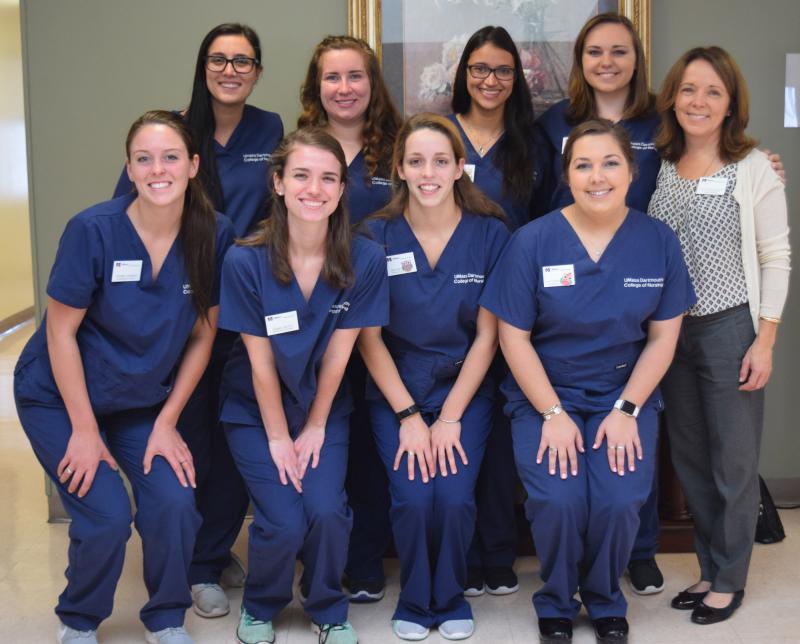Nursing students, seniors bond over card games, healthcare, and Haiti
A group of University of Massachusetts Dartmouth nurses forged a special bond with both seniors in Dartmouth and children in Haiti through a community nursing program.
For the past six weeks, junior-level students in the college’s nursing program visited with seniors at the Council on Aging, volunteering their time to host blood pressure clinics, chat with seniors, and create long-lasting bonds.
Up until this point, most nursing students are trained in acute care settings — hospitals, and bedside care, explained instructor Paula Walsh. In their junior year, nursing students are given the choice to work locally through the university’s community nursing program.
“It gives them a very different perspective of nursing,” Walsh said.
Junior Rebecca Pelicas spent a lot of time socializing and playing card games with seniors. Although she struggled to keep up with her tough competition, she noticed a sharper side of Dartmouth’s elderly population.
“We had so much in common we didn’t realize, and that was exciting,” added junior Maggie McCormack.
Community volunteering was only part of the nursing program this year. The students also participated in a global nursing curriculum, which culminated in a week-long trip to Haiti.
Before leaving for Hispaniola, students learned about Haiti's culture, politics, and poverty, and took a crash course in Creole. Their course covered basic words and phrases, as well as words necessary for basic medical services like check-ups. Students brought three suitcases filled with toiletries to offer as donations as well.
“Something as simple as soap or toothpaste is hard to come by,” Walsh explained. “The average family in Haiti lives on less than $2 a day.”
Once in Haiti, nurses worked alongside doctors and nurse practitioners to provide about 250 children in Partners in Development’s pediatric clinics with routine check-ups, and cared for children in its sick clinic.
“We had a fully-functioning lab and a pharmacy filled with donated medicine,” McCormack said, noting that in Haiti, any form of medical care is a luxury. “When kids were sick, we could easily provide medicine for them.”
While living conditions were not perfect — students lived on campus in a dormitory building that lacked air conditioning despite 100-plus degree days, slept on makeshift beds made from two-by-fours, and showered with collected rainwater — they were treated to three home-cooked meals a day. That included goat and the group’s favorite dish, fried plantains.
Working in a country with such extreme levels of poverty was an eye-opening experience for the future nurses. Junior Jessika Dunn had to balance diet recommendations for her patients with their tough financial circumstances and limited food availability. Nurses also saw children and adults with major dental issues, also due to a lack of nutrition.
McCormack added that, at times, her role as a nurse transitioned into the role of an educator as she taught patients about their own health.
The trip also included a stop at a housing development, where nurses pitched in to build a house. Living conditions in Haiti are such that each of the four rooms – about 14-by-14 feet each – will house an entire family. Through a micro-loan program, the houses come with an $8 per month payment.
Students gave a presentation of the Haiti trip at their final meeting with Council on Aging members on April 27. During the six-week program, many seniors asked about the students' trip, and, much to students' surprise, some seniors noted they had just sent knitted items and donations to the country.











